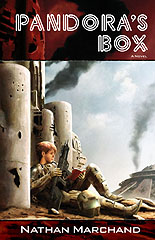
A few weeks ago, Marvel Comics released the 13-episode series Daredevil on Netflix. My longtime readers won’t be surprised when I say that it was this show–the first of five that Marvel is releasing exclusively to the streaming service–that made me finally sign up for Netflix. I’ve made it no secret that I love superheroes, comic books, and the Marvel Cinematic Universe.
(If you’d like to read my official review of the series, go to my Examiner page here).
One of the things I find most interesting about Daredevil is he is one of only a few Christian superheroes that I know of (Nightcrawler from X-Men is another). He’s Catholic, to be specific. I was curious to see how his faith would be handled in this series since Hollywood has a track record for presenting Christians as hypocrites, loons, or both. I thought they might gloss over his faith, at best.
I was pleasantly surprised to see that his faith was an integral part of his character. He unabashedly identifies himself as Catholic, even saying that it’s what keeps him going most of the time. But most importantly, his faith isn’t simplified. In fact, it makes him a complicated character. Conversely, he’s not the squeaky-clean, nigh-perfect Christian character usually presented in faith-based movies.
(WARNING: SPOILERS AHEAD!)
Matt has endured much tragedy. He was blinded as a boy after shoving a man out the way of a truck, which then accidentally dumped chemicals on him. His father, a mediocre boxer, was murdered by mobsters because he refused to throw a fight. He spent the next several years in a Catholic orphanage dealing with his radar-like super-senses (a “gift” of the chemical bath) until he was trained to fight by a skilled but amoral blind old man, who eventually abandoned him. Is it any wonder he adopted the faith of the orphanage? He needed it to go on. It spurred him to become a lawyer so he could help clean up Hell’s Kitchen.
But Matt quickly learned the limitations of the law. He told the story of hearing a man in the next-door apartment sexually molesting his eight-year-old daughter. Because of his super-senses, he was the only one who knew about it. The mother didn’t believe it, and, as he said, the father was “smart” and managed to convince Child Protective Services he was innocent. So, one night, having gotten sick of it, he put on a mask, tracked the father down, and beat him up, threatening to make the next one worse if he ever touched his daughter again. “I could sleep better after that,” he said.
This was his first night as a vigilante, which by definition is someone who operates outside the law to enforce some form of justice. It goes counter to what Matt normally would stand for as a lawyer. Yet it doesn’t. As Matt states in a courtroom speech, the law concerns itself with facts and not necessarily truth. It can only act based on the evidence that is presented. Plus, as Matt learns while trying to take down his archenemy Wilson Fisk (aka Kingpin), cops and judges can be bought or bullied to offer criminals protection. This brought Matt to a crossroads. The only way to stop Fisk seemed to be killing him, but as he confessed to his priest, such an act would damn his soul. This was only one of the many spiritual struggles he had concerning the morality of the often brutal tactics he used to enforce his vigilante justice.
What was brilliant about it was it all seemed realistic and believable. I’ve heard of many people in real life who’ve wrestled with huge moral issues (though, admittedly, they weren’t costumes vigilantes…so far as I know…). At one point Matt was willing to risk damning his soul if it meant saving his city. Ultimately, he found another way, but it may not be the perfect solution (that’ll be revealed in season 2). This struggle is presented with great respect. The show’s creators remember that religion is a large part of many people’s lives. It shouldn’t be mocked or ignored. (I also admit that putting characters in moral dilemmas is something I enjoy and used to do a lot in my own stories).
On the other hand, Matt would probably be criticized by many Christians (and perhaps fellow Catholics) because he isn’t perfect. Besides his questions of morality, he has (small?) vices like swearing and possibly pre-marital sex (it’s never shown and details aren’t offered, so the audience is left to decide). Yet at no point did I question the authenticity of his faith. It reminded me that things like cussing don’t always mean a religious person has a weak or superficial faith. Legalism never helps anyone.
What do you think? Did you see the series? How should Christian characters be written in fiction?




